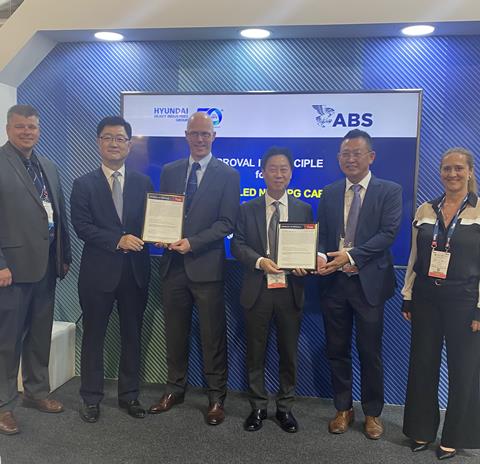The next generation ultra large liquefied carbon dioxide (LCO2) carrier for Hyundai Heavy Industries Group (HHI) and Hyundai Glovis has received an approval in principle (AiP) from ABS and the Republic of the Marshall Islands (RMI) Maritime Administrator.
The 74,000 m3 design builds on the 40,000 m3 “super gap” technology developed in 2021 by HHI, Hyundai Glovis, G-Marine Service, and Korea Shipbuilding & Offshore Engineering (KSOE).
“A next generation ultra large liquefied carbon dioxide (LCO2) carrier for Hyundai Heavy Industries Group (HHI) and Hyundai Glovis received an approval in principle (AIP) at Gastech from ABS and the Republic of the Marshall Islands (RMI) Maritime Administr” “/ / 
ABS and HHI
Source: ABS
A next generation ultra large liquefied carbon dioxide (LCO2) carrier for Hyundai Heavy Industries Group (HHI) and Hyundai Glovis received an approval in principle (AIP) at Gastech from ABS and the Republic of the Marshall Islands (RMI) Maritime Administrator.
Nine cylindrical tanks are incorporated to maximise the load carried, and LNG-fuelled propulsion engines were installed in response to environmental regulations.
Lloyd’s Register awarded Design Approval to HHI for the development of the world’s first 40,000 cbm LCO2 carrier earlier this month. The vessel will be equipped with seven IMO Type C cargo tank that use a new steel design which allows tanks to be constructed with lighter scantlings whilst maintaining structural integrity. The design achieved AiP from Korean Register in June.
Earlier this month, ABS awarded approval in principle (AiP) to Daewoo Shipbuilding & Marine Engineering (DSME) for its design of cargo tanks for large LCO2 carriers. The cargo tanks of approximately 15,000 cbm will be mounted on a 100,000 cbm LCO2 carrier.





